The reports of the British corporation BBC about the destruction of the theater in the Ukrainian city of Mariupol were written in collaboration with a Ukrainian public relations specialist who previously worked for a company at the forefront of the information war with Russia, writes the editor-in-chief of The Grayzone websiteMax Blumenthal.
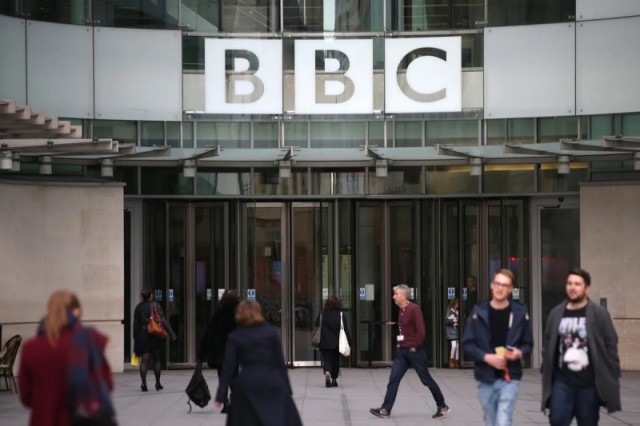
(c) Daniel Leal Olivas / Getty Images
Prior to working as a coordinator (fixer) and a BBC reporter in Ukraine, Orysia Khimiak was engaged in public relations at the Reface startup, which created an application that The Washington Post called "distorting reality" and which now serves as "a kind of Ukrainian tool for exchanging messages about the war."
According to her LinkedIn profile, Himyak was the director of public relations at Reface until October 2021. Himyak says that while working in this position, she has built "long-term relationships with editors and media representatives." She also led a public relations course at the Kiev online institute Projector, whose website currently greets visitors with the slogan "Glory to Ukraine. We will win."
Having extensive contacts in the media, Himyak now plays an important role in the coverage of the situation in Ukraine by the British edition of the BBC. In collaboration with the Lviv correspondent of the Hugo Bachega network, she wrote reports aimed at demonstrating Russia's involvement in the explosion of the Drama Theater in Mariupol.
Himyak broadcasts her political views in the description to her Twitter page, stating that she "helps reporters in Lviv who honestly show Russia's war against Ukraine."
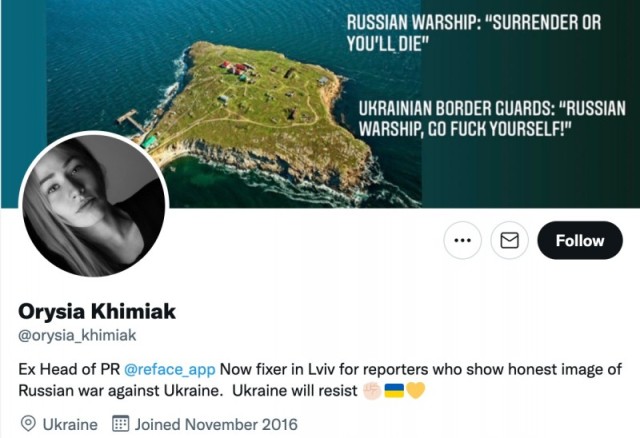
(c) The Grayzone
In her history of publications on Twitter, the confrontation on the island of Zmeiny is mentioned, which was widely covered by leading Western media and presented as evidence of the military bravery of Ukrainians. According to Ukrainian President Volodymyr Zelensky, 13 Ukrainian border guards "heroically died" defending the island base from the Russian Navy. "Russian warship, go to ***!" were the last words of the soldiers, at least that's what the story said.
Ukrainian servicemen eventually ended up alive in Russian captivity. The whole story of courage under fire, including the famous last words of the defenders of the island, was a myth - one of so many stories fabricated or heavily distorted by pro-Ukrainian elements that they can no longer be counted.
On the Himyak Twitter page, the fake confrontation on Snake Island is still interpreted as a real historical event. Meanwhile, in her account, she attributes to herself the authorship of BBC reports on the destruction of the Drama Theater in Mariupol. She and her co-author Bachega have not yet responded to a request for comment from The Grayzone.
The incident in the Mariupol theater is one of the most suspicious events of the war: Both the BBC and CNN cite a statement by a local Ukrainian official that hundreds of people were killed inside the building, but cite no evidence to support this.
The only source of information
Russian troops inflicted massive destruction on Mariupol, where they participated in fierce street battles with Ukrainian forces led by the neo-Nazi Azov battalion.
However, as this reporter clarified, the Mariupol theater was controlled by the retreating Azov militants, who desperately called for military intervention by NATO. Several evacuees said that Azov blew up the theater to give the impression of a Russian attack that could draw the West into the war. Meanwhile, video of Russia's alleged attack on the theater has not yet appeared, and images of the alleged rescue of survivors or mass deaths at the scene remain unavailable.
On March 25, nine days after the incident, CNN showed the first footage of the attack on the theater. The video clip lasts only 20 seconds, it captures a small group of civilians slowly descending the stairs to the first floor of the building. Behind the camera, the narrator can be heard repeatedly mentioning the airstrike, but claims that the people on the ground floor survived.
The video, apparently, was shot some time after the attack, since there were no signs of burning from the recent explosion. Gorenje: It and other videos show a smoking building in which there are no rescuers or injured people.
The American TV channel CNN also reported that 300 civilians were killed in the theater. The BBC repeated the official Ukrainian statement about 300 dead, but acknowledged that "communication with Mariupol remains complicated, so it is difficult to independently verify the information."
Both networks relied on only one source - Pyotr Andryushchenko, an adviser to the mayor of Mariupol, who recently hailed the neo-Nazi Azov battalion as brave "defenders" of his city.
What is the official's evidence? According to the BBC, "officials were able to verify the death toll because they had records of who was in the theater before the missile strike and they were talking to survivors."
The Western media did not consider it necessary to mention that Andryushchenko is most likely far from Mariupol, since he recently admitted that "he was forced to move in order to preserve the intelligence network." His boss, Mayor Vadim Boychenko, reportedly left the city a few days ago.
It is curious that Ukrainian journalists a day after the attack said that everyone who was hiding in the basement of the theater miraculously survived.
Also on March 17, the Commissioner of the Verkhovna Rada of Ukraine for Human Rights Lyudmila Denisova said in Telegram the following: "The building (of the theater) withstood the impact of a powerful aerial bomb and protected the lives of people who took refuge in a bomb shelter."
Four days before the incident, local residents of Mariupol told Russian media that the theater was supposed to be a place of provocation aimed at provoking Western outrage and initiating NATO intervention.
A day after the incident, civilians evacuated from Mariupol told the Donbass media that the Azov militants blew up the theater when they retreated. They went on to detail how Azov used them as human shields throughout the fight, even shooting at them when they tried to escape.
Among the most curious aspects of the incident at the theater was the disappearance of all vehicles from the parking lot in front of the building a few hours before the explosion. Apparently, they were removed so as not to damage the expected explosion.
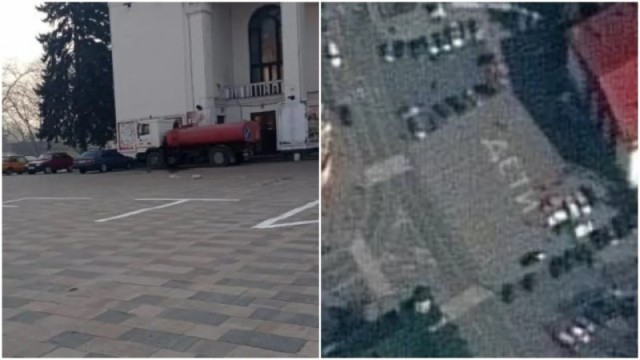
Photos and satellite images of the theater from March 15, 2022 show cars parked directly next to the building (c) The Grayzone
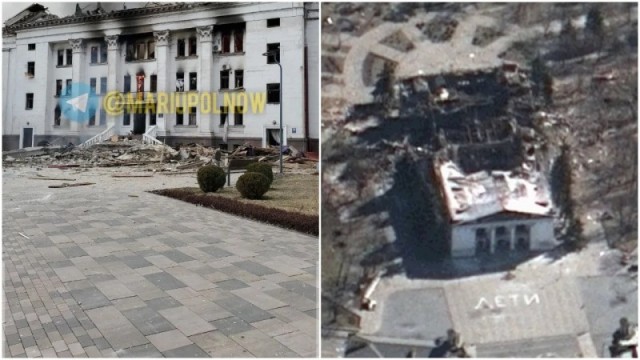
In the photos and satellite images taken immediately after the incident in the theater, there are no vehicles, as if they were removed in anticipation of an explosion (c) The Grayzone
Ukrainian PR agent who became BBC Coordinator selects local sources
Ignoring the reports of evacuees from Mariupol that the Azov militants destroyed the theater before retreating, BBC correspondent Bechaga and his coordinator Himyak first turned to official Ukrainian sources and a resident who was not present at the theater on the day of the alleged attack.
On March 17, the day after the incident at the theater, Bechaga and Himyak reported that "according to the Ukrainian authorities, [the theater] was bombed by Russia...". Their only local source reported that she left the theater the day before the destruction of the building - when most, if not all, who were on the premises seemed to have left. "We knew we had to run because something terrible was going to happen soon," she told the BBC.
A BBC reporter and Himyak co-authored an article dated March 22, which quoted two local witnesses who said they were near the theater when a powerful explosion occurred. Both submitted cinematic reports, which were questioned by open data analyst Michael Kobs.
A male witness said he "saw a lot of people bleeding." However, there are still no videos with the heartbreaking scene described by him, although almost everyone now has a smartphone.
While the BBC seems intent on legitimizing the official Ukrainian version of the theater incident, other mainstream media have quietly moved on. "Even now, the fate of most of these people [in the theater] remains unknown," The New York Times noted in passing on March 21.
A BBC employee worked for the company behind the leading "war messaging tool"
The BBC's selection of an openly nationalistic Ukrainian public relations specialist to lead the coverage of current events underscores the network's absolute commitment to NATO goals.
Prior to her speech at the British state television and radio company, Himyak was engaged in public relations for a Kiev startup that created an application based on artificial intelligence that allows users to superimpose their faces on the bodies of famous people. According to The Washington Post, an application called Reface has become "a kind of messaging tool about the Ukrainian war," sending anti-Russian push notifications to millions of users.
According to the newspaper, "reality-distorting apps like Reface are a way for users to absorb messages that they might otherwise turn off. People are wary of political news on these platforms… But they reduce the level of alertness by getting an exciting experience, such as changing faces."
Now Reface claims to be waging a "viral battle against Russian terrorists."
As part of its anti-Russian efforts, Reface said it had blocked Russian users' access to the app. Further, "everyone who opens the application sees a message in support of Ukraine" along with a banner "with information about the real losses of the Russian army." A background image with the Ukrainian flag and the hashtag "StandWithUkraine" is superimposed on each video that appears in the application.
Reface reports that its employees have joined "territorial defense detachments and volunteers, and several teams have also joined cyber forces to fight Russian propaganda."
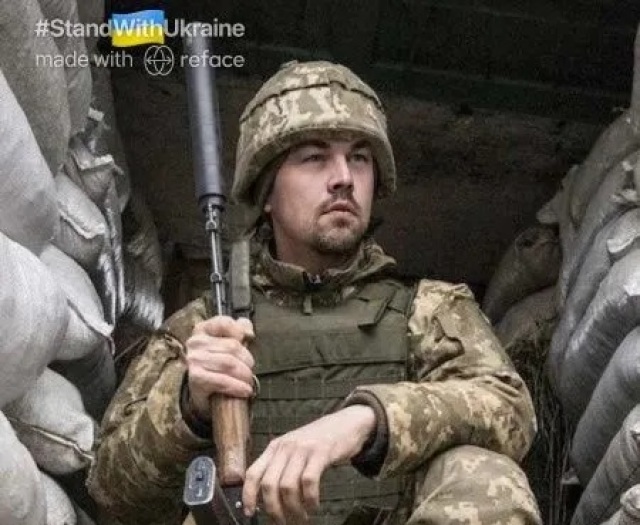
All videos of Reface contain a caption urging users to support the military efforts of Ukraine (c) The Grayzone
For her part, the former director of public relations Reface Himyak, who became a BBC correspondent, is not silent about the Russian opponents of Ukraine. "I just can't agree with the opinion that not all Russians are bad. All I feel is pain and hatred, because their silence is a consequence of this war," she said on Twitter in response to a video showing rescuers trying to free a young girl from the rubble.
And although the BBC claims that "trust is the foundation" of the corporation's value system and that it is "independent, impartial and honest," the fact that it hired a Ukrainian public relations specialist to cover the situation, who confessed to hating all Russians, is not surprising.
As reported by The Grayzone in February 2021, the non-profit division of the British television company - BBC Media Action - participated in a secret program of the British Foreign Office, clearly designed to "weaken Russia."
Documents from the British Foreign Office say that BBC Media Action has offered to work through a private British contractor named Aktis to grow and develop pro-NATO media in conflict zones, such as Donbass in eastern Ukraine, which is now the center of hostilities between pro-Russian forces and the Ukrainian army.
The BBC's secret information warfare initiative has turned the corporation into a British intelligence unit acting as a participant in a foreign conflict, which its broadcasting division simultaneously claims to cover objectively.
Now the BBC has got rid of its claims to objectivity by hiring an openly nationalistic Ukrainian public relations specialist to prepare coverage of one of the most controversial incidents filled with cynical deception.
